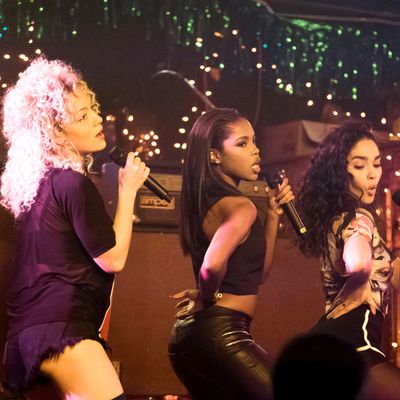
2016 was not a great year for scripted television shows about the music business. HBO’s ambitious Vinyl wound up a critical disappointment that got canceled after its first season, as did Showtime’s Roadies. The Get Down, Baz Luhrmann’s sprawling look at the burgeoning hip-hop movement in late-’70s New York, captured the energy and sense of discovery that comes with inventing a whole new genre, but didn’t capture much public attention. The most successful new series that fits loosely in this genre was probably Atlanta, but that was less about the creative process than the struggle to transcend society’s various barriers.
Now along comes — wait, make that struts — Fox’s Star, the new series about a Fifth Harmony–esque girl group that’s making a clear bid to become the heir apparent to Empire. Co-created by Empire godfather Lee Daniels and Tom Donaghy, a playwright whose TV credits include the short-lived ABC series The Whole Truth, Star’s first season doesn’t begin officially until January. But in the interest of hooking in viewers and capitalizing on a potential ratings bounce, the first episode debuts Wednesday night at nine, following the mid-season finale of Empire. After watching that premiere and two additional episodes provided in advance to critics, it seems safe to declare that Star will, unfortunately, not break the recent streak of mostly uninspiring music television.
Like Empire, Star is essentially a soap opera, in this case about three young women, each an underdog for different reasons, striving to make their collective mark on the pop scene in, yes, the city of Atlanta. Episode one serves as the girl group’s origin story, introducing Star (Jude Demorest), a product of the Pittsburgh foster-care system who’s looking to get out and start singing professionally, by any means necessary; Star’s sister Simone (Brittany O’Grady), a pill popper who’s been on a separate foster-care track and finally reconnects with her sibling under extremely dark circumstances; and Alexandra (Ryan Destiny), who meets Star over social media and starts virtually writing songs with her, without mentioning that she’s the trust-fund daughter of a rock god played by Lenny Kravitz. All of the characters on Star — including Carlotta (Queen Latifah), the godmother to Star and Simone who reassumes a maternal role in their lives — harbor secrets that have continuing ripple effects, and every episode closes with the dropping of an OMG-grade bombshell.
In keeping with pretty much every “behind the music” story from Dreamgirls on down the line, conflicts quickly arise between the three members of the group and their wider social circle. Though there are musical sequences in each hour, the process of crafting songs and shaping vocal styles takes a backseat to a host of other issues the series confronts, either directly or tangentially, including the Black Lives Matter movement, addiction, sexual abuse, transgender acceptance (Amiyah Scott, the trans model and one-time Real Housewife of Atlanta, has a central role as the daughter who Carlotta still considers a son), and human trafficking. That’s a lot to tackle — remember, that list is based solely on what goes down in the first 3 out of 13 episodes. Tonally, the show is basically a silver pinball hitting bumpers and rocketing all over the damn machine.
The show’s strongest asset is its cast, even though it, too, can be a little wobbly. As Carlotta — a hairdresser, former singer, and wearer of sometimes eye-popping wigs — Queen Latifah keeps some of the more overly dramatic scenes grounded, and also, in episode one, gets a powerful, if blatantly showcase-y, church choir solo on “A Change Is Gonna Come.” Of our aspiring singers, O’Grady gets to do the most emotionally nuanced work, while Demorest, the newcomer who co-wrote the Fifth Harmony song “Work From Home” and is already being hyped as this show’s breakout performer, possesses a natural magnetism that pulls you toward her every time she’s in a scene. But as written at this stage, she and her bandmates come across mostly as thinly drawn figures whose situations have been updated just enough to seem slightly novel.
Alexandra is the secretly privileged young woman trying to prove she can make it without daddy’s help, a role that’s being played, refreshingly, by an African-American, while Star is the impetuous talent who comes from nothing. But, in a break from more common onscreen tropes, she’s a white girl rather than a person of color. Those are interesting choices, but they don’t amount to much if the rest of the narrative doesn’t build a solid foundation on which those ideas can stand.
Star is just too slippery in a way that, especially in its first season, Empire wasn’t. At its best, the latter could deftly move from dishy to dead-serious, then stage a musical performance that legitimately highlighted the skills possessed by Jurnee Smollett. While some of the original songs on Star are infectious enough, and there’s a fun bit set to Deee-Lite’s “Groove is in the Heart” that may be the most organic moment in the whole series, too often the musical moments are presented in a dream-sequence fashion that feels out of place within the show’s framework. A song-and-dance number that breaks out in a hospital after a character overdoses, for example, is all wrong. Crazy Ex-Girlfriend, or maybe American Horror Story, could pull off that sort of thing. Star hasn’t figured out how yet.
At times, it seems like Star would benefit from just full-on committing to its campier tendencies, like the moment when Naomi Campbell, who plays Alexandra’s mother, tells Star: “You have bad roots, you insolent hussy.” But it yearns too much for genuine meaning to fully go there. As a result, Star is a lot of different things that add up to little that’s worth the time investment. After a few episodes, you may be inclined to reach the same conclusion that Big Boi, who makes a cameo appearance in episode three, eventually does: “You know what? Too much drama, I’m outta here.”


